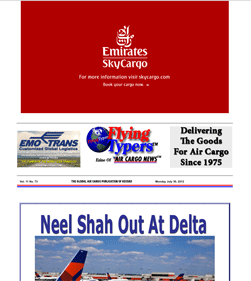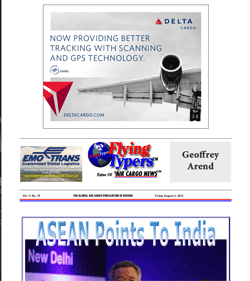 |
 |
|
| |
||
|
Vol. 11 No. 76 Tuesday August 7, 2012 |
| |
|
“Our
top priority (for 2012) is to
continue to align our business
processes and systems to make
it easier for our customers
to do business with us and for
our co-workers to deliver excellent
service to our customers,”
said Mr. Anderson.
Business
for United has been going well
so far, as can be attested by
Mr. Anderson.
“We
began new, daily, widebody Newark-Istanbul
service on July 1, and we’re
very pleased with the development
of this cargo market thus far.
Looking at the larger market,
we’re in the middle of
the typical summer slow season
for cargo.
“But
overall business is good for
the airline, and we continue
to make adjustments to improve
our performance and profitability
in line with our merger synergy
commitments.
“We’re
very excited to be the North
American launch carrier for
the Boeing 787 Dreamliner.
“United
plans to take delivery of five
787s in 2012— first these
will be used to add incremental
wide body capacity in a number
of domestic markets.
“Beginning
next year, the 787s will open
up a number of new international
long-haul markets for United’s
customers—including recently
announced Denver-Tokyo service
beginning in Spring 2013.
“I
think most businesses—not
just the cargo industry—are
concerned about the lack of
consistent growth in the global
economy.
“In
air cargo, we are also impacted
by excess capacity in a number
of areas.
“The
question on everyone’s
mind is how much of a peak season
we will see, but for now it
remains a challenging marketplace.
“Despite
the uncertainty, we are proud
of the way our teams are working
together to meet the challenges.
“When
you consider that United Cargo
has not yet harvested the bulk
of our synergies, we have many
reasons to be upbeat about where
we are now.
“We
continue to make great progress
in our integration, and this
will allow us to fully realize
the potential of United’s
unparalleled network and the
largest widebody fleet among
belly carriers.
“I
think the best is yet to come,”
said Mr. Anderson.
Regardless
of how well or how poorly a
cargo season runs, the one thing
that often holds it all together
is the people, who constantly
make strides and push business
forward despite the economic
climate.
|
“I’ve
met a great number of impressive
and inspirational people this
year—both inside and outside
United Airlines.
“One
person that stands out is Dave
Williams, Vice President of
Network Operations for the United
States Postal Service. I met
Dave when the USPS and United
convened to discuss how we could
work together to enhance United’s
performance along with our increased
mail volumes.
“Dave’s
intensity and his high levels
of focus and commitment instantly
impressed me. He deployed both
operational and people skills
to help drive immediate enhancements,
and he fostered an enhanced
spirit of collaboration that
turned those enhancements into
long-term gains for both organizations,”
said Mr. Anderson.
The
most important thing to take
into consideration when operating
in this day and age is customer
feedback—it’s easier
than ever to both reach out
to your customer base and have
them reach out to you, and so
far, United is receiving positive
notes for 2012.
“Our
customers continue to reinforce
the importance of delivering
operational excellence every
day, on every flight, with every
shipment.
“They
also tell us how important it
is that our Sales team is visible
and attentive to their needs.
We’re gratified that feedback
from our customers confirms
that we’re keeping our
focus where it needs to be.
“In
terms of surprises, we are impressed
by the strength and growth rates
in the specialty product market.
“Our
TempControl product for temperature-sensitive
pharmaceuticals and our PetSafe
service for live animals continue
to be among United Cargo’s
primary success stories in 2012,”
said Mr. Anderson.
Geoffrey
Arend/Flossie
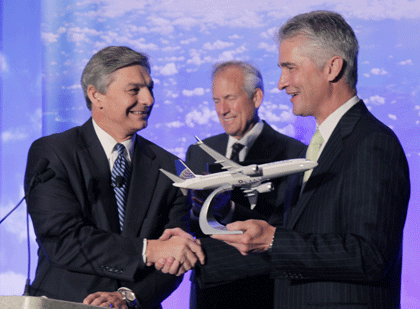
Spend a few billion and you get to keep the model . . . Boeing CEO Ray Conner, presents a model of a new 737 Max 9 to United Airlines CEO Jeff Smisek during a news conference as Boeing CEO Jim McNerney looks on in Chicago. United bought 150 B-737s last month.
 
|
Get
On Board Air Cargo News
FlyingTypers |
If
You Missed Any Of The Previous
3 Issues Of FlyingTypers |
|||||
|
|||||
FT073012 |
FT080312 |
||||
|---|---|---|---|---|---|


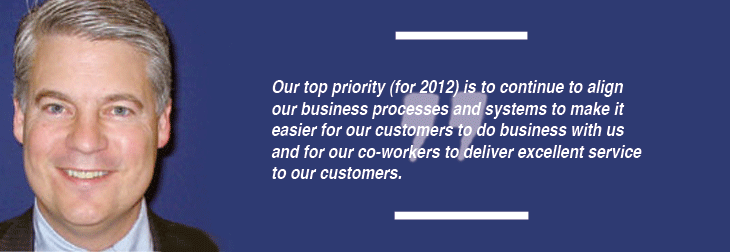
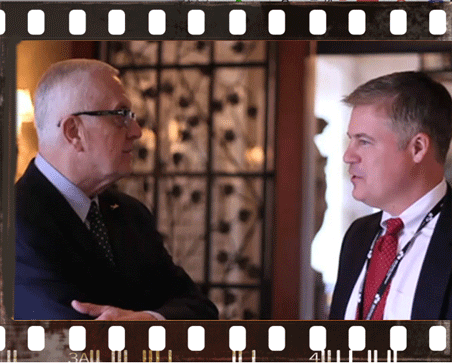
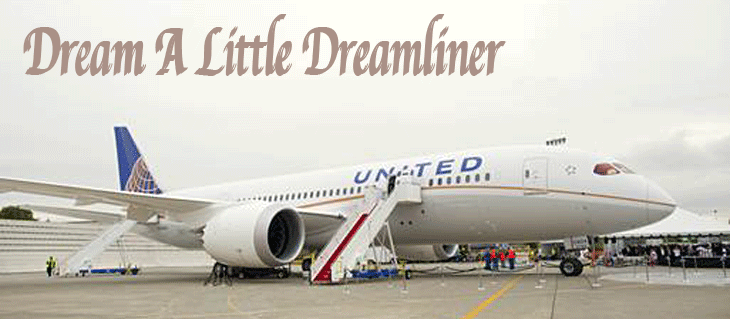
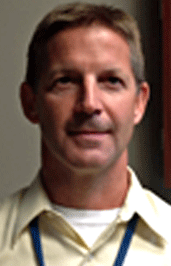
 I
sat down with Ken Mykytiuk,
(left) recently named Delta
Air Lines Cargo general manager
safety, security and compliance
and with Derek Duiser, (right)
manager cargo security, to hear
about how the FAA mandated SMS—safety
management system—works.
I
sat down with Ken Mykytiuk,
(left) recently named Delta
Air Lines Cargo general manager
safety, security and compliance
and with Derek Duiser, (right)
manager cargo security, to hear
about how the FAA mandated SMS—safety
management system—works.
